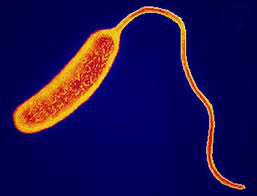To turn more virulent and antibiotic-resistant, the bacterium that causes cholera uses a tiny spear to kill neighbouring bacteria, even of its own kind, and then steal their genetic material, shows a new research.
 This mechanism, known as “horizontal gene transfer”, allows the cholera bacterium to become more virulent by absorbing the traits of its prey, the researchers said.
This mechanism, known as “horizontal gene transfer”, allows the cholera bacterium to become more virulent by absorbing the traits of its prey, the researchers said.
Cholera is caused when the bacterium Vibrio cholerae infects the small intestine. The disease is characterised by acute watery diarrhoea resulting in severe dehydration.
“Using this mode of DNA acquisition, a single V. cholerae cell can absorb fragments containing more than 40 genes from another bacterium,” said Melanie Blokesch from the Swiss Federal Institutes of Technology, Lausanne in Switzerland (EPFL).
The tiny killing device that the bacterium uses is called the “type VI secretion system” and is known to exist in many types of bacteria.
When V. cholerae comes close to other bacteria, the spear punches a hole into the latter, leaving them to die and release their genetic material, which the predator pulls into itself, the findings showed.
For the study, the researchers tested different strains of the bacterium from all over the world.
What they found was that the tiny spear also contributed to gene transfer, which could eventually make the bacterium more resistant to antibiotics.
The study appeared in the journal Science.
Reference:
Borgeaud S, Metzger LC, Scrignari T, Blokesch M. The type VI secretion system of V. cholerae fosters horizontal gene transfer. Science 02 January 2015. DOI: 10.1126/science.1260064
